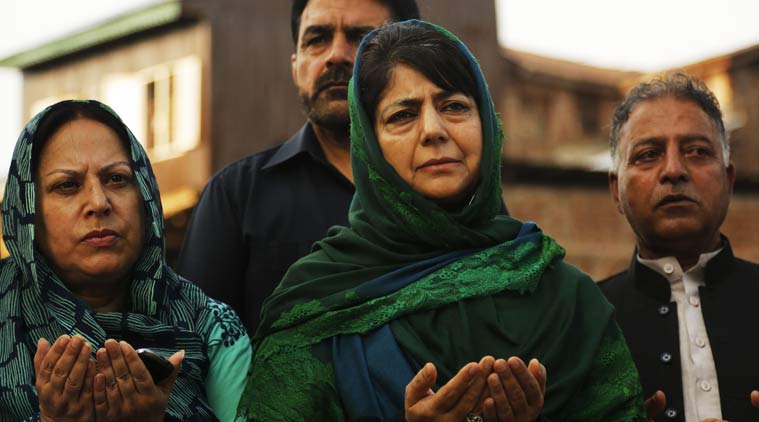Once, she was the face of PDP’as ‘healing touch’, combining a politics of compassion with strident dissent of New Delhi. 50 people are dead and houses across Kashmir are mourning. Mehbooba would have wanted to be in the Opposition today. But she is the Chief Minister.
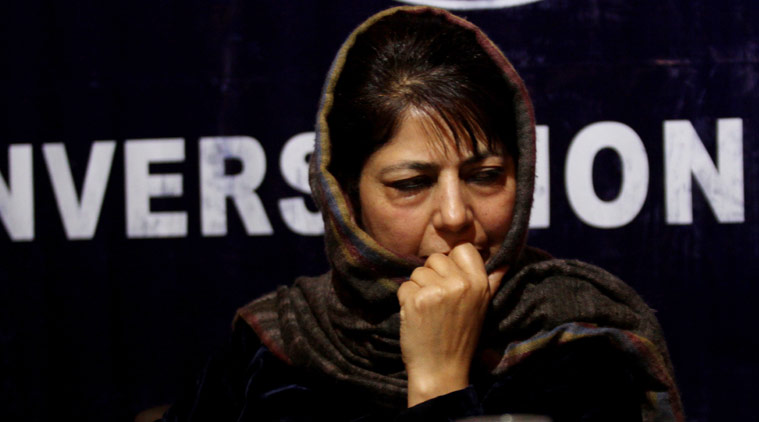 17 years after its inception, when the PDP is the largest party with 28 legislators and its “rooh-e-ravan (heart and soul)” Mehbooba is at the helm, her government is seen as the enemy of the people.
17 years after its inception, when the PDP is the largest party with 28 legislators and its “rooh-e-ravan (heart and soul)” Mehbooba is at the helm, her government is seen as the enemy of the people.The year was 2000. Public anger against the ruling National Conference (NC) was at its peak: the party had decided to continue its alliance with the BJP even after the Atal Bihari Vajpayee-led Central government had summarily rejected its resolution for restoration of autonomy. The scion of the Abdullah family, Omar, was a junior minister in the Vajpayee Cabinet. His father and then chief minister Farooq Abdullah would regularly call for military strikes against Pakistan. “Catch them by their b***s, hearts and minds will follow” — this graffiti written on the wall of a paramilitary camp in Anantnag had become the motif of New Delhi’s Kashmir policy and Kashmiris saw the NC government as a willful participant.
This was the time a woman attired in an abaya, her head covered with a scarf, would leave her home in Nowgam locality on the outskirts of Srinagar. She would sit in a run-down bulletproof Ambassador car and, along with a handful of anxious security guards, travel to far-off villages in Kashmir. Mehbooba Mufti’s programmes didn’t follow the traditional lexicon of pro-India parties in Kashmir. Instead, she would carefully follow the calendar of killings, both of civilians and militants, choose a family and go to their home even at the risk of her life. She would sit with the women and share their pain. She wouldn’t talk politics. Mourning was her politics.
It worked. The PDP rode to power in 2002 and the victory was celebrated by a large section of the people who, fatigued by years of conflict, hoped for an “honourable resolution of the Kashmir dispute” in the success of Mehbooba and her team.
Today, 17 years after its inception, when the PDP is the largest party with 28 legislators and its “rooh-e-ravan (heart and soul)” Mehbooba is at the helm, her government is seen as the enemy of the people. The massive upsurge across Kashmir, triggered by the killing of Kashmiri militant Burhan Wani and the subsequent civilian killings, has exposed another reality: that Mehbooba, once in power, is hard to tell apart from her arch rival Omar Abdullah (NC) of 2010.
Even the PDP’s own leaders admit that the social legitimacy they once enjoyed is fast dwindling. A few days ago, when Mehbooba met a few of the families of those killed in firing by security forces in Anantnag, she didn’t go to their homes. Instead, the district administration arranged for a photo-op in the dak bunglow. She wasn’t able to visit the injured in hospital. A hotel owned by Abdul Rahim Rather, the PDP legislator from Kokernag, was set on fire while Khalil Bandh, the PDP MLA from Pulwama, was seriously injured when protesters pelted stones at his car. The Pulwama MLA was too afraid of people’s wrath to go to any of the civil hospitals in Srinagar and had to be taken to the Army’s 92 Base Hospital.
After 50 people were killed and more than 3,000 injured, many of them maimed for life, Mehbooba did try to address the people, but not many were convinced. And when she said that “the sacrifice of those killed would not go waste”, not many understood what she meant.
“Leave aside her appeal for calm, we were shocked to see her statement against Pakistan the day (Union Home Minister) Rajnath Singh was here. She would always talk about the need to bring Islamabad on board and not alienate them,’’ a PDP leader said. “Farooq Abdullah would speak this language when he was in power here and Mehboobaji built her entire party opposing that.”
“It is a fact that even after weeks of Burhan’s killing, our government is still searching for answers. Perhaps there are no answers,’’ the PDP leader said. “The change that we see on the ground has gone beyond anger against us. The grey zone we created between the political black and white of integration and azadi in Kashmir has disappeared. In fact, the entire middle ground stands delegitimised.”
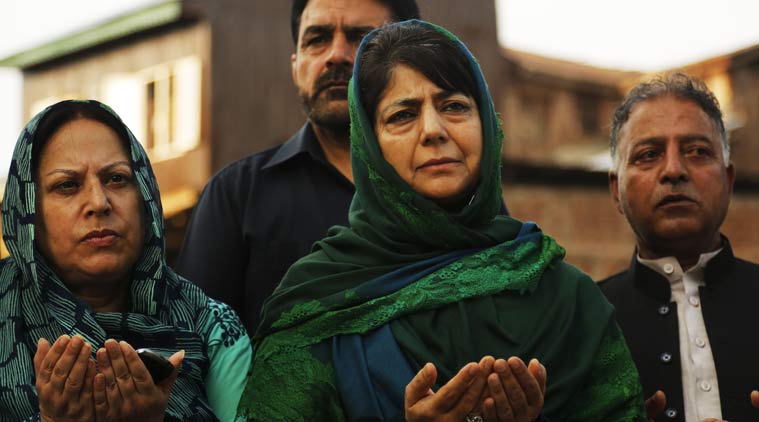 Earlier when Mehbooba spoke, her theme was always human rights violations by the J&K Police and Army. She was so vehement in her opposition to the security establishment that even the separatists couldn’t match her.
Earlier when Mehbooba spoke, her theme was always human rights violations by the J&K Police and Army. She was so vehement in her opposition to the security establishment that even the separatists couldn’t match her.
Once there was a rebel
While her father Mufti Mohammad Sayeed practised integrationist politics all his life, Mehbooba and her new politics were the centre of the discourse in the newly-formed PDP. Mufti, who was Union home minister when militancy began in Kashmir in 1990, was always seen as Delhi’s man. For decades, he was unable to win an election in Kashmir as his integrationist politics didn’t go down well with the people of Kashmir.
Born on May 22, 1959, Mehbooba studied at Presentation Convent in Srinagar and after a BA in English Literature from a government college in Jammu, studied law at Kashmir University. For five years, she worked in Bombay Mercantile Bank in Delhi before working with East West Airline for a brief period. This is when Mufti, unable to find candidates for the Congress for the 1996 Assembly polls, convinced Mehbooba to join politics.
Mehbooba’s accidental entry into politics — and subsequent victory from the Muftis’ ancestral home in Bijbehara — coincided with a new political journey for Mufti. Within three years, in 1999, he left the Congress and set up the PDP with Mehbooba and her strong pro-Kashmir rhetoric as its face.
When Mehbooba spoke, her theme was always human rights violations by the J&K Police and Army. She was so vehement in her opposition to the security establishment that even the separatists couldn’t match her. Steadily, Mehbooba created a space for her party and built a social legitimacy that was unexpected for a pro-India political party.
She took to wearing her abaya to ensure that she didn’t stand out as an outsider in rural Kashmir. The PDP borrowed its poll symbol of inkpot and pen and the green of its flag from the erstwhile Muslim United Front, a conglomerate of political, social and religious parties that fought against the NC-Congress alliance in the 1987 Assembly polls.
“Mehboobaji started visiting families of militants to condole the killing of their sons and campaigned against human rights violations. She spoke a language that was sympathetic to militants. She knew that people were going through a lot of suffering,’’ said a PDP leader.
In fact, Mehbooba would refer to militants as “our boys in the jungles” and advocated “goli se nahin boli se (not with bullets but dialogue)” as the way forward. She would speak out against “State-sponsored terror”.
In 2002, the PDP was declared victorious in the Assembly election though it had only secured 16 seats while the NC, with 28 members, was seen as a defeated party. The Congress (20 seats) chose the PDP over the NC and despite having more seats than the PDP, made Mufti CM. “It wasn’t about numbers. The PDP was seen as the winner that election because it had managed to achieve some sort of social legitimacy,’’ a senior PDP leader said. “We were a pro-India party but we were not considered enemies of Kashmiri people. That was our victory.”
Whether in power or without, Mehbooba questioned the police and the security establishment, continuing to raise her voice against human rights violations. In 2008, the party came up with a roadmap that promised a solution that was only a step less than complete sovereignty. Based on soft separatist positioning, the party sought a joint administrative mechanism for the two Kashmirs, a porous Line of Control and even dual currency (both India and Pakistan). Thus the PDP’s roadmap, which it billed as an “achievable solution” to end the conflict “with dignity and honour”, transcended the NC’s autonomy plank. While in government between 2002 and 2008, the party coined the term “healing touch” and promised an end to human rights violations.
The PDP also managed to win over several highly educated Kashmiris who wielded influence and credibility within the larger civil society and were also seen as sympathetic to the resistance movement. For example, current Education Minister Naeem Akhtar was one of the five top J&K government officers who were dismissed from service in 1990 for “anti-government and anti-India activities”. Akhtar was reinstated after J&K employees went on a three-month strike and he established himself as a strong “pro-Kashmir” voice. Similarly, current Finance Minister Haseeb Drabu was respected for his strong articulation of Kashmiri nationalism. There are several others who had crossed over from the separatist camp to the PDP. At one point, the Jamat-e-Islami too gave tactical support to the PDP with an aim to see it replace the NC.
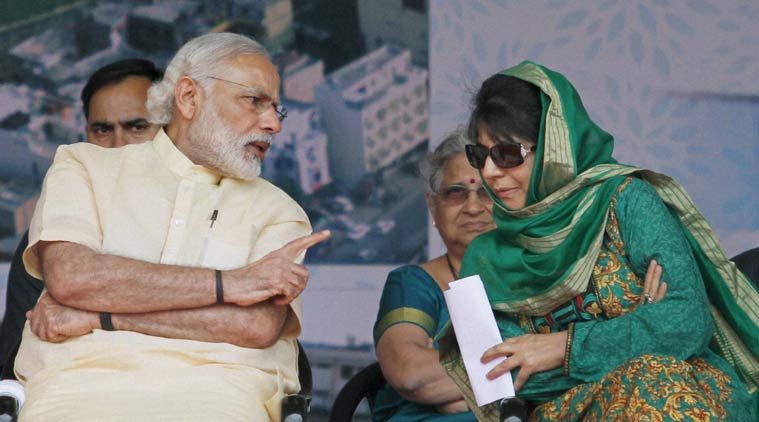 After her father’s death, Mehbooba even lost the battle of nerves with the BJP when she agreed to take over after months of waiting.
After her father’s death, Mehbooba even lost the battle of nerves with the BJP when she agreed to take over after months of waiting.
A costly handshake
By the 2014 elections, the PDP’s promise of self-rule had begun to ring hollow. But the big blow came when the party came to power in 2014 in alliance with the BJP. Almost overnight, the conversation on the ground changed. Soon, the PDP was seen as ceding ground to the BJP on every major political issue. After her father’s death, Mehbooba even lost the battle of nerves with the BJP when she agreed to take over after months of waiting, failing to convince the BJP-led Centre to announce even customary confidence building measures to ensure her some political manoeuvrability on the ground.
“There will be elections and people will again come out to vote. They don’t have much of a choice. They will have to chose between us and the NC. But the loss we face is much bigger than what any election result will tell you,’’ a PDP youth leader said. “We had carefully built some sort of social legitimacy. We lost that when we joined hands with the BJP.” He said that this social legitimacy cannot be recovered through any level of development or administrative measures. “You can decorate roads with gold, you can distribute freebies, you can do charity work but it will never help regain the social legitimacy. We are now worse off than even the NC. It is all black and white now,’’ he said.
He said he had never felt the need for security in his village. “Today I can only visit my village in the dead of the night,’’ he said. “We had built our base on the promise of self-rule where the Line of Control would cease to exist as a dividing line. Today, Mehboobaji can’t even mention self-rule. There is no doubt that we aren’t the party that we were during the campaign for the last Assembly polls. Mehboobaji understands this reality.”
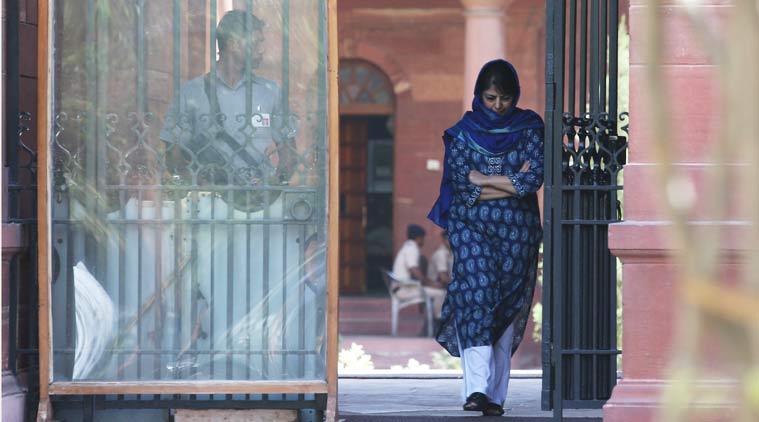 Unlike previous governments at the Centre, the current regime’s Kashmir policy has no room for manoeuvrability.
Unlike previous governments at the Centre, the current regime’s Kashmir policy has no room for manoeuvrability.
Why then did Mehbooba go with the BJP?
“What choice did she have? Not a single MLA told her not to form the government, which meant that they wouldn’t go with her if she broke the alliance,’’ said the youth leader. “Besides, how can a pro-India party go against Delhi’s wishes in Kashmir? We weren’t ready to face the wrath of Delhi because we wouldn’t merely be seen as opposition; we would be considered separatists by Delhi. On the ground here, we wouldn’t ever get the kind of legitimacy that the separatists enjoy. The sentiment for azadi would never go away. This is why we chose the easy way.”
The BJP, however, looks at it differently. Deputy CM Nirmal Singh said there was no question of any of the alliance partners surrendering to the other. “Ours is neither a political alliance nor an ideological one; it is a governance alliance,” he said.
He argued that the people of the state had voted for good governance and that Mehbooba’s success in the recent by-election in Anantnag, which she won by a margin of over 10,000 votes, shows her “increased acceptability” among people in the Valley. “However, some vested interests have been raking up non-existent issues like Sainik Colony, Pandit colonies etc,” he said.
The PDP youth leader felt the party’s alliance with the BJP was just one reason for the breakdown of the narrative the party had created. “India and its dominant political discourse have changed. For our predecessors, including our own government in 2002, the challenge was to resolve problems with the Indian State. For example, there would be instances when Kashmiri students or businessmen travelling outside the state would be picked up by police, suspecting them to be militants. There was mistrust but it was limited to police and agencies only. Now people of India have developed serious mistrust of Kashmiris. Its fallout is devastating. We spend a lot of money and send our students to different colleges across mainland India so that they are assimilated and return as Indians. But these youngsters encounter such hostility and communalism that they return convinced that Kashmir isn’t part of India,” he said.
Unlike previous governments at the Centre, the current regime’s Kashmir policy has no room for manoeuvrability. While the Congress policy was to maintain status quo as a means to manage conflict, the RSS, which plays a large role in New Delhi’s Kashmir policy, isn’t happy with any political grey zone. It will settle for nothing less than complete integration.
This shift in New Delhi’s policy was clear from the very beginning. In August 2014, after the Pakistan High Commission in Delhi invited Hurriyat leaders for a customary meeting, New Delhi called off the foreign secretary-level talks. And when, in his first press conference as CM after the 2014 Assembly elections, Mufti thanked Pakistan and militants for having allowed peaceful polls, BJP leaders openly ridiculed him. Earlier, such comments by a new CM would have been ignored as harmless political posturing.
“They (the Centre) only talk of sending additional forces as if that will solve the problem. Leave aside offer of serious talks, this (Central) government refrains from even a gimmick in the name of dialogue,’’ said CPI(M) leader and Kulgam legislator M Y Tarigami. That “gimmickry” by previous regimes in New Delhi, including Vajpayee’s, had kept the PDP in the game.
“When we came to power for the first time in 2002, people at the helm in New Delhi understood that a peace enforced through military operations can’t work. Today, the problem is that the reconciliation effort in Kashmir doesn’t have the approval of the Central government,” said a senior PDP leader.
While Mufti was heading the PDP-BJP alliance, the party and its sympathisers had also created the illusion of two separate power centres within the party, with Mehbooba portrayed as the voice of dissent against her own government. That ended with Mehbooba’s elevation as CM after her father’s death. Today, the PDP’s own cadres see the party’s alliance with the BJP as an unceremonious surrender of its politics. The poor participation at Mufti’s funeral was a clear indication of this disillusionment. The PDP leadership didn’t pay attention to such signals and when Mehbooba hesitated to take over, top PDP leaders convinced her to do so.
Though the trigger for the recent public outpouring was Wani’s killing, a close look at the events of last year makes it clear that anger had been gradually building up. Public participation in militant funerals had been going up. Besides, during encounters, people would pelt stones at the police and the Army to help militants escape. The five districts of South Kashmir, the PDP’s stronghold, saw an increase in recruitment of local youth into militancy.
Ever since the current coalition took shape in J&K, there was fear that efforts were being made to change the very character of Kashmir with an aim to undo the conflict. For example, when the PDP-BJP coalition moved to set up a Sainik colony in Srinagar, it was seen as a move to change the demography of Kashmir. There was a context to this fear too: in its poll manifesto, the BJP had promised a Sainik colony in every district of the state.
While Indian Muslims have generally opposed the azadi movement in Kashmir, fearing dangerous consequences for them, Kashmir too has largely remained aloof to the larger Muslim concerns outside the borders of the state. This is why Kashmiri Muslims hardly reacted to the 2002 riots in Gujarat. This time round, however, every inflammatory statement made by a BJP leader regarding Indian Muslims had a resonance in the Valley because the party is in power in J&K too.
At a time when the middle ground carefully crafted by the PDP is receding, the battle lines in Kashmir have become stark. Like in New Delhi, the narrative on the ground in Kashmir too has lost its layers of complexity. Many in Kashmir feel they have only two choices — accept complete integration with the Indian Union or fight for azadi. They came out in large numbers and attacked symbols of the State. For the first time after early 1990s, they took to streets to endorse a militant.
Fifty people are dead, thousands are injured, and houses across Kashmir are mourning. Mehbooba would have wanted to be in the Opposition today. But she is the Chief Minister.

